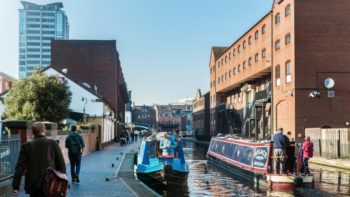The Birmingham Economy
As might be expected for the UK’s second city, Greater Birmingham’s economy is also something of a juggernaut, contributing £23.2 billion to the UK’s GDP in 2014. The wider West Midlands has a total economic output of £94 billion. Only London has a larger economy.
Situated in the Midlands, though just an hour and a half north of London by train, 98% of the UK market is within 4 hours travel time of the city, making it an attractive UK headquarters for companies. There are also 143 direct connections from Birmingham International Airport, facilitating business links with the rest of Europe and the world.
We’ve already mentioned the 5 universities and 5 further education colleges Birmingham hosts. There are a further 20 universities within an hour of Greater Birmingham.
Retail is also booming and Birmingham is in the top three UK shopping destinations almost every year. The most recent available statistics put retail expenditure at £2.43 billion. With annual spending on clothing at £313 per capita, Birmingham is the UK’s most fashionable city, ahead of even London.
Employment statistics show one area that Birmingham can still improve on with 67.7% of the city’s population economically active compared to a national average of 77.8%. Over 2015, unemployment sat at 9.4% against a national average of 5.2%. While highlighting one weakness in the city’s economic fabric, these stats show plenty of room for growth in what is already the country’s second largest economy.
The median gross weekly pay for full-time workers in Birmingham comes in at £488.2, compared to a national average of £527.7. Those working in Birmingham earn more or average than actual residents with median gross weekly pay of £538.7, demonstrating the city’s commuter drawing power. The services sector is the city’s largest contributing most to both employment figures and overall economic output. Within services, health is the largest industry, reflecting the fact that the city hosts a number of large hospitals.
The youthful Birmingham population and high density of universities and graduating students, together with comparatively lower salaries in the city has proven to be a significant draw for Foreign Direct Investment in recent years. The 2015 UK Attractiveness Survey, an analysis of foreign direct investment (FDI) into the UK over 2014, highlighted that the West Midlands region saw the largest number of new FDI projects in over a decade. 92 were initiated, up 46% on 2014’s 63.
Birmingham City Council’s master vision for the future is heavily focused upon upskilling and driving professional qualifications within the city’s significant migrant population. Adult education is a particular priority.
Birmingham’s 20-year ‘Big City Plan’ was launched in 2010 and will expand the city centre by 25% to cover 800 hectares, including broad upgrades to the urban environment and connectivity. Investing in Birmingham key infrastructure and transport projects have added to this sense of urban regeneration and transformation. The first phase of the £56bn high-speed HS2 railway connecting London to Birmingham, Manchester and Leeds is due to open in December 2026. HS2 will bring travel time between London and Birmingham down to 40 minutes and is expected to have a significant impact on the local economy.




